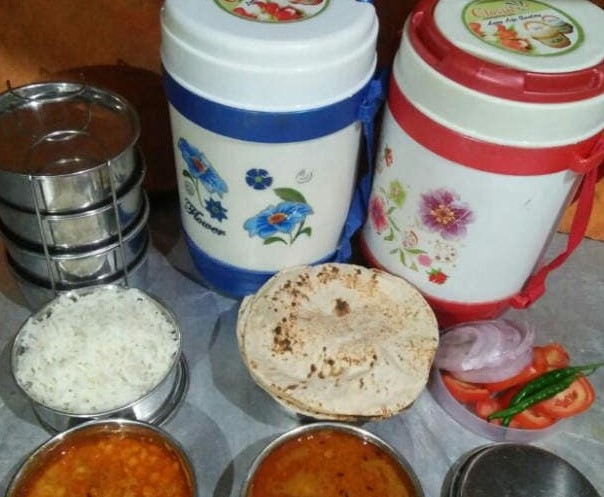Delhi’s dabbawallas have little on their plate during pandemic

Lack of information about when the schools and colleges may reopen spells more trouble for the dabbawallas who depend entirely on cooking and delivering food to students and young professionals (MIG Photos)
With educational institutes shut, students gone back to their native places and people working from home, earnings for dabbawallas in Delhi has have dropped drastically.
“My only source of income is preparing and delivering food to students living as paying guests and young professionals who live independently. I charge INR 80 per meal from a customer. I used to earn about INR 35,000-40,000 a month before the pandemic. With the colleges shut and people working from home, the number of customers has dropped to less than half of what it was. I used to prepare and deliver food for 15-16 regular customers on a daily basis earlier but now I am left with four regular customers and can barely make INR 8,000 a month,” says Shobha Mondal, who has been cooking and delivering food for over 11 years, in CR Park and Kalkaji localities in southern New Delhi.
Mondal says that it has been very difficult for him to make both ends meet. He lives in a rented flat with his wife and two teenaged daughters. He is currently living off his savings but is worried about entirely exhausting them before his regular customers are back or he finds new ones. Before the pandemic, Mondal was able to pay his rent, his daughters’ school fee, grocery supplies, daily expenses and even save around INR 8,000 per month.
But in mid-March, as the Covid-19 pandemic hit India and government shut down all educational institutions, students returned to their home towns and Mondal lost most of his customers. Working professionals also asked Mondal not to deliver food to them as their offices were closed and they worked from home. “I often call them but they say that as they’re working from home, they want to cook their own food. And some of them also mention they couldn’t take risk of infection by getting food delivered to them every day from outside,” Mondal adds.
In another part of the national capital, GTB Nagar, which is famous for housing thousands of students studying in North Campus of Delhi University; the situation is even worse for Vijay Kumar, who has been cooking and delivering food to students since last six years.
“I didn’t realise the effect this pandemic would have on me till students started telling me that they were going home and won’t need food from next day onwards till they come back. I assumed their colleges would open in a month and they would come back. But it has been more than four months now. None of them has come back yet. The university is closed, paying guest accommodations are closed and my income is not even a sixth of what it used to be. My earning has dropped from INR 35,000 a month to barely INR 6,000 per month now. I had a monthly contract for food delivery with three paying guest services and all of sudden, they all cancelled their contracts. I am still to pay back the advance amount they had given me. Though they assure me of work as soon as students come back, I know it won’t happen anytime soon,” says Kumar.

From buying groceries and other raw materials to cooking and finally delivering food door to door, dabbawallas do everything on their own
Kumar and Mondal are but two of the hundreds of dabbawallas in Delhi who cook and deliver food to students and professionals every day. From buying groceries and other raw materials to cooking and finally delivering food from door to door, they do everything on their own.
Paying guest services and hostels abound around colleges and universities in different parts of Delhi. And dabbawallas as well as other service providers, catering to the needs of students – domestic maids and laundry services, for example – throng these places, offering reliable yet economic services.
“I was dependent upon daily tiffin service from a local provider for the past two years. I liked the quality of food, punctuality in delivery and it was also inexpensive, costing me only INR 60 per plate. Since the onset of the pandemic, I’ve started cooking my own meals and often order from online apps as it assures me of hygienic conditions in cooking and delivery. Though each meal costs me at least thrice as much, but the online apps provide details like chef’s and the delivery person’s temperature and the hygiene rating of the restaurant I order from. It makes me feel safer,” says Anuj Sinha, a final year student at Delhi University, who stays at GTB Nagar in northern Delhi.
Even though the lockdown has been eased, educational institutes continue to be shut across the country and teaching has moved online. There is no information about when the schools and colleges may reopen. This spells more trouble for the dabbawallas who depend entirely on cooking and delivering food to students and young professionals. With a lack of clarity, many have been looking for jobs elsewhere to earn a regular income and take care of their families. But the collapse of the Indian economy has put a dampener even on that.
“I never thought this pandemic would hit my family like a huge disaster. My wife has asked me to look for other jobs as demand for our food will remain meagre for as long as the pandemic continues. And we have to manage payment of house rent and school fees for my daughters at any cost. My wife and I have done nothing but cooked food and delivered meals for 11 years now and it is extremely difficult to find any alternative work at this time. And I am not even hopeful of seeing better days anytime soon,” Mondal adds dolefully.









